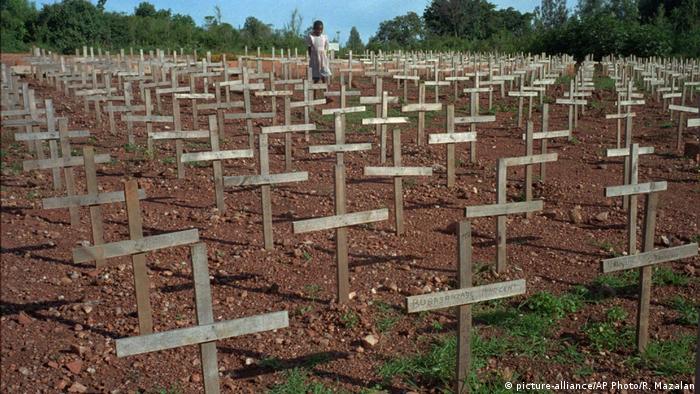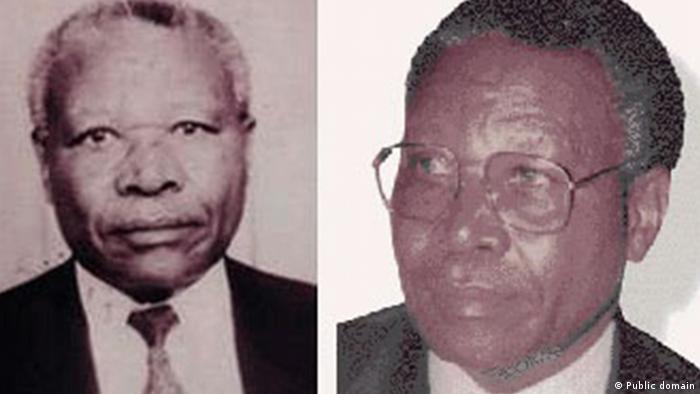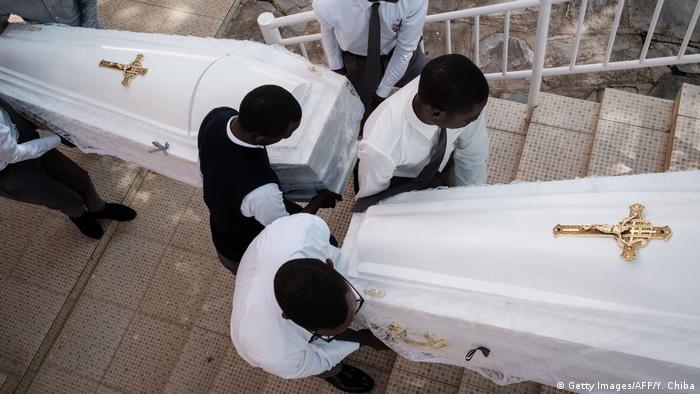Human rights defenders are celebrating the arrest of a key perpetrator of the Rwandan genocide. But many other suspected perpetrators are still at large. Experts say the mills of justice are turning too slowly.

More than a quarter of a century after the Rwandan genocide, one of the main suspects has been caught: 85-year-old Felicien Kabuga was arrested in Paris on May 16. The entrepreneur had been on the run for more than two decades and living under a false name. He is accused of bankrolling the genocide and was considered one of the most wanted men in the world.
"Kabuga is, of course, the top one," says DW Rwanda expert Fred Muvunyi. There were similar reactions in the small town of Muniga, Kabuga's birthplace.
"He was the one who founded the RTLM radio station, which fueled the hatred between the Rwandan ethnic groups," says one resident who wishes to remain anonymous. "He imported and distributed masses of machetes, which killed hundreds of thousands of Rwandans. We are pleased that Kabuga has been arrested. We would prefer he was sent to Rwanda and put on trial here."

Felician Kabuga's trial will be closely watched around the world
Read also: Opinion: Rwandan genocide arrest offers solace to survivors
Where will justice take place?
Rwanda's Minister of Justice, Johnston Busingye, has confirmed that the government is keen to have Kabuga tried in Rwanda. But the most important thing at the moment is that the French police have finally caught him.
"According to our information, despite an international arrest warrant, Kabuga has traveled freely between several countries in Europe over the past 25 years," says Busingye. "He was not arrested in any of those countries. We appeal to all countries who are hiding suspects to arrest these people, as France has finally done, so we can bring them to justice."
Fred Muvunyi says Kabanga is unlikely to be extradited to Rwanda, however. Instead, he will probably appear before the United Nations (UN) International Residual Mechanism for Criminal Tribunals (MICT). The MICT is a successor to the UN's International Criminal Tribunal for Rwanda (ICTR), which was dissolved five years ago.
"It is not yet clear whether Kabuga's trial will take place at the MICT headquarters in The Hague in the Netherlands, or at the branch in Arusha, Tanzania," says Muvunyi. At this stage, though, Arusha would appear to be the obvious choice — after all, it's much easier to summon witnesses from Rwanda to Tanzania than to the Netherlands.
According to the current UN protocol, the MICT is responsible for those who organized, supported, or executed the genocide in Rwanda, explains Muvunyi:
"Felicien Kabuga is undoubtedly part of this high-profile group of perpetrators. But so are people like Augustin Bizimana, the defense minister during the genocide, as well as the then-security chief of the president, Protais Mpiranya."
Over 1,000 active arrest warrants
According to the Rwandan government, seven high-profile genocide perpetrators are still at large — including Augustin Bizimana and Protais Mpiranya. There are also thousands of other lesser-known suspected perpetrators currently hiding abroad. Rwanda's prosecutors have issued over 1,000 arrest warrants against suspects in 33 countries over the past few decades.
"There is a special police search unit in Rwanda that searches for suspected perpetrators who still roam freely in different countries around the world," explains Muvunyi. "Many of them are believed to be in Uganda or the Democratic Republic of the Congo (DRC), while others have fled to Malawi, Cameroon, and Zimbabwe. An even bigger number is believed to be in Europe, especially in Germany, the Netherlands, France, and Belgium."

According to the UN Security Council more than a million Tutsis were killed
More arrests on the horizon?
But how is it possible that these suspects can go into hiding for so long?
"They are usually very rich and have connections to high government circles in the countries where they're hiding," explains Muvunyi. "We know that, for example, they were very closely linked to Robert Mugabe's regime [in Zimbabwe]."
In Europe, too, the police and the judiciary have been accused of turning a blind eye in the past and not cooperating with Rwandan investigators. Rwanda has already issued around 30 international arrest warrants for suspects living in France, but they rarely get support from local authorities, says Justice Minister Busingye. These included Agathe Habyarimana, the widow of the former president Juvenal Habyarimana, and the former Minister of Public Works, Hyacinthe Nsengiyumva Rafiki.
Read also:Belgium: Rwandan official found guilty of genocide
The trial of Felician Kabuga will provide valuable clues that could lead to the arrest of other suspected perpetrators and accomplices, says Patrick Baudouin, the honorary president of the International Federation for Human Rights (FIDH).
"This case could reinforce international arrest warrants issued by the MICT, and the principle of universal jurisdiction could be revived," he told DW. In France alone, there are currently several active investigations against 28 alleged co-conspirators of the Rwandan genocide.
Muvunyi says at least one thing is clear: "An overwhelming majority of Rwandans want the suspected perpetrators to be arrested and, if found guilty, punished, no matter where or by whom. Nobody wants their crimes to be swept under the rug."
Genocide Sylvanus Karemera and Eric Topona contributed to this article.
DW RECOMMENDS
Rwanda genocide suspect Felicien Kabuga appears in court
Investigators have requested the extradition of Rwandan genocide suspect for his alleged role in financing the country’s 1994 genocide. Felicien Kabuga was arrested after police tracked him down through his children. (20.05.2020)
25 years on, Rwandan genocide still reverberates throughout the region
The mass slaughter of 800,000 Tutsi by the Hutu majority in 1994 has had far-reaching consequences not only for Rwanda itself but also for the country’s relationship with its neighbors. (01.04.2019)
Date 21.05.2020
Author Antonio Cascais
Keywords Felicein Kabuga, Rwanda genocide, courts, justice, Rwanda
Permalink https://p.dw.com/p/3caXy
No comments:
Post a Comment